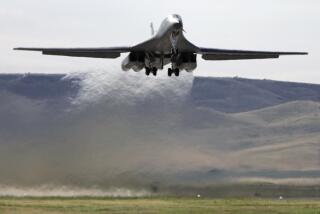Setting the record straight on the Tuskegee Airmen
TUSKEGEE, ALA. — Melissa MacDougal’s junior high project chronicles the history of America’s first black military pilots so meticulously it is displayed at the Tuskegee Airmen National Historic Site.
How much longer it will remain there is unclear.
The 3-D tribute says “the 332nd Fighter Group never lost a bomber to enemy fire.” That claim has been made in speeches, history books, autobiographies and newspaper articles for decades.
Now two historians say it is a myth.
The pair, Daniel Haulman of the Air Force Historical Research Agency at Maxwell-Gunter Air Force Base in Montgomery, Ala., and William Holton of Tuskegee Airmen Inc., say the group’s combat mission reports show that at least a few bombers escorted by the airmen were shot down by German planes.
About 130 of the 994 pilots are alive today, and many are upset by what they view as an assault on the airmen’s distinguished military record.
“I think this is being initiated by people who want to discredit the fact that we were unique,” said retired Col. Richard Macon, 85, of Detroit, who carried out 18 combat missions before being captured as a German prisoner of war.
The historians’ findings overshadowed a recent ceremony for the airmen at the Alabama Capitol in Montgomery. Congress had voted to award the airmen the Gold Medal, its most distinguished civilian award, but as the men gathered to meet Gov. Bob Riley and launch a national fundraising drive for a memorial in Tuskegee, reporters peppered them with questions about whether they had lost any bombers.
The controversial research has been supported by Warren Ludlum, a bomber pilot in World War II who recently told the Associated Press that he was shot down by enemy planes over Austria in 1944 while being escorted by Tuskegee Airmen fighters. He said he was sure because he ended up in the same prisoner-of-war camp as one of the black airmen, Starling Penn.
That doesn’t convince Alan L. Gropman, author of “The Air Force Integrates: 1945-1964” and a professor at the National Defense University in Washington. “The fact the two men were in the same prisoner-of-war camp does not necessarily mean the Tuskegee Airmen were escorting those particular airplanes,” he said, calling for more research.
A group of airmen plans to do just that.
Tuskegee Airmen Inc. President Russell Davis, a retired Air Force lieutenant general, said the men are too frail to travel to Alabama and Pennsylvania in the winter but hope to examine the documents in the spring. They are in their late 80s.
Despite the dispute, the historians, airmen and others agree that the group’s legacy rests not on whether they lost any bombers but on the broader role they served in challenging fundamental stereotypes about intellectual ability.
The men who learned to fly in the small town of Tuskegee in east Alabama from 1941 to 1946 and became the 332nd Fighter Group were part of a military experiment. When Congress forced the Army Air Corps to form an all-black combat unit in 1941, a prevailing stereotype was that black men were not capable of being fighter pilots.
“You have to understand there was a general assumption back then that black people did not have innate intelligence or courage,” said political science professor Alvin Thornton of Howard University in Washington. “Their role was crucially important -- on a par with all the struggles to overcome white supremacy.”
The airmen performed with distinction during World War II. In Europe, they flew more than 15,000 missions and earned a reputation for extraordinary discipline. Bomber pilots, Gropman said, often requested to be escorted by the Tuskegee men because they would stay close to the bombers -- unlike other units that might abandon them for the glory of shooting down German fighters.
Haulman and Holton said they simply wanted to set the historical record straight.
“If I didn’t share my knowledge, I would be derelict in my duties as historian of the Tuskegee Airmen,” Holton said. “Of course, this is painful. Some of the people I admire very much are incensed.”
Gropman said he wasn’t surprised by the reaction.
“By calling it a myth, they are saying the men have been lying, the whole organization has been lying,” he said. “It seems like the men were deliberately promoting this falsehood. They weren’t. They believed in it earnestly.”
The contention that the airmen never lost a bomber may have originated from a letter of commendation Col. Buck Taylor gave to Col. Benjamin O. Davis Jr., the leader of the Tuskegee Airmen.
Benjamin Davis, who died in 2002, recounts in his 1991 autobiography that Taylor “remarked that ours was a fine military organization: Among our accomplishments, we had achieved the distinction of never losing a single bomber to enemy fighters on an escort mission.”
Haulman said several documents challenged that statement. Most significant, a 1944 order awarding Benjamin Davis the Distinguished Flying Cross praises him for “so skillfully disposing his squadrons that in spite of the large number of enemy fighters, the bomber formation suffered only a few losses.”
At the Tuskegee Airmen National Historic Site, retired Air Force Lt. Col. Herbert Carter, 87, said every Tuskegee flier felt a responsibility to have a perfect record.
“To be successful, we knew, our performance would have to be above reproach and of such quality there would be no question of capability as pilots,” he said. “Our failure would reflect and cast doubts, and reaffirm some of the biased thinking that we were inferior as a race.”
Russell Davis of Tuskegee Airmen Inc., discussing why many of the surviving pilots were distressed by the historians’ challenge to their record, said: “You’re talking to gentlemen who had to fight for the right to fight.
“These men had horrible experiences of discrimination, and some of them see this as an opportunity to denigrate their experiences once again.”
Macon, a Detroit Lions fan, used a football analogy.
“Let’s say the Detroit Lions quarterback was never tackled before he got his passes thrown,” he said. “The guys are proud. They brag about it. It’s quite a thing for anyone to challenge that.”
More to Read
Sign up for Essential California
The most important California stories and recommendations in your inbox every morning.
You may occasionally receive promotional content from the Los Angeles Times.











